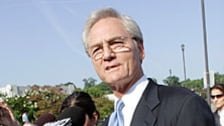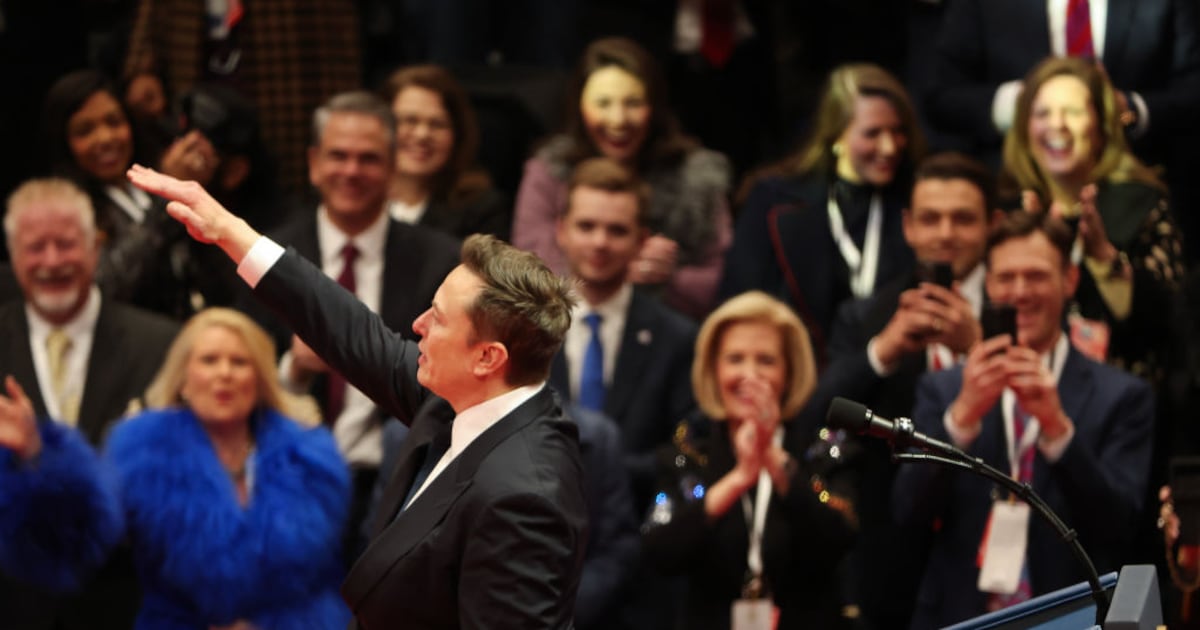
The most dramatic political prosecution in the 21st century—involving a former governor in Alabama, the U.S. Attorney’s office, and the Bush White House and Justice Department—has been rocked by incriminating new disclosures by a knowledgeable career Justice Department staff member who has provided information charging serious misconduct by the prosecutors.
Among other disclosures shattering the credibility of the case, U.S. Attorney Leura Canary’s “recusal” for conflict of interest is revealed as a sham. Moreover, The Daily Beast has learned, the matter has touched off concerns within the Justice Department over efforts to sweep accusations of unethical conduct under the carpet.
It appears the Justice Department was aware of even more startling allegations of misconduct but it chose to hide this from the court and from opposing counsel.
With the Obama transition in full swing, the Justice Department is rushing to conclude a number of internal probes dealing with serious questions about the conduct of political appointees. One of the most troubling of these comes out of Montgomery, Alabama, where a U.S. Attorney with close ties to Karl Rove and her husband, then advising a Republican candidate for the Alabama statehouse, undertook one of the most audacious political prosecutions in recent history: knocking off the Democratic opponent, former Alabama Governor Don E. Siegelman.
Before his prosecution and conviction on federal charges, Siegelman was the most successful Democrat on Alabama’s political stage in the era after George C. Wallace. He was convicted more than two years ago on political corruption charges after a jury deliberated nine days and was initially deadlocked. Siegelman is now set to argue his appeal in Atlanta on December 9.
But even before the appeal is argued, the prosecution’s key evidence has been broadly attacked as unreliable and false and the prosecution itself has become the target of a Congressional probe and is the subject of demands for disciplinary action. Remarkably, however, the Bush Justice Department has reacted by covering-up the prosecutorial misconduct, which has connections that lead straight to the Bush White House.
Siegelman accepted a campaign donation from Richard Scrushy, a health care executive he appointed to a state oversight board. The U.S. Attorney, Leura Canary, argued this was tantamount to sale of a public office and brought charges. (By comparison, the Bush Justice Department never examined any of the 146 donors of $100,000 or more to the Bush-Cheney campaign who were later appointed by President Bush to federal sinecures—taking the view that this was “politics as usual.”)
Canary’s husband, William Canary, is Alabama’s leading Republican political consultant. At the time Canary launched the Siegelman case, he was advising one of Siegelman’s Republican adversaries for the governorship. He later came to advise then-Congressman Bob Riley, a Republican who defeated Siegelman in the closest gubernatorial contest in Alabama’s history.
After ethics complaints were brought to the Justice Department, Leura Canary was nominally removed from the case. But in a circumvention of normal Justice Department rules approved by Associate Deputy Attorney General David Margolis, she was allowed to pick one of her deputies to manage the case against Siegelman in her stead. Canary represented to Congress that she removed herself from the case “before any significant decisions” had been reached. Now internal communications have been disclosed within Canary’s own office calling into question these claims.
Beginning in the summer of 2006, after the conviction was obtained, information emerged in the public domain that lent credence to Siegelman’s charges that the case was the result of a politically motivated conspiracy and quickly caused the prosecutors’ case to unravel. The judge who tried the case, George W. Bush-appointee Mark Fuller, was revealed to have held a longstanding grudge against Siegelman and been active in Republican campaigns against him—facts Fuller failed to disclose.
Fuller issued a notably harsh sentence against Siegelman and ordered him to be taken from the courtroom in manacles. A Republican political operative with close ties to Rove, Jill Simpson, disclosed in a May 2007 affidavit that she had been present during a telephone conference at which Canary’s husband, Karl Rove protégé William Canary, stated that he had spoken with “Karl,” that “Karl” had spoken with Justice, and that “his girls” would “take care of” Siegelman. An exposé by CBS 60 Minutes later charged that the prosecution had relied on false evidence and that exculpatory documents had been suppressed—what would amount to potentially criminal conduct by the prosecutors.
Fifty-two former state attorneys general—led by former Republican Arizona attorney general and McCain for President national co-chair Grant Wood—petitioned Congress demanding that it investigate troubling irregularities in the case. The House Judiciary Committee convened a series of hearings, but the Justice Department and the White House stonewalled requests for documents and demands that the prosecutors submit to questioning. Then the Court of Appeals intervened with a dramatic and extraordinary order setting Siegelman free.
In the weeks that followed, the U.S. attorney’s efforts to defend the case were steadily eroded, as evidence surfaced that career prosecutors had recommended against a prosecution of Siegelman but had been overruled by political appointees. Rove first agreed to testify about the matter, but refused to appear when he was subpoenaed to testify. The New York Times’s Charlie Savage reported this week that the Bush White House was eagerly looking for reasons to block probes of its meddling in the Siegelman matter after Bush leaves office on January 20.
Now a member of the Siegelman prosecution team has leveled serious charges against her colleagues, specifically challenging the truthfulness of Canary’s claims to have taken herself out of the decision-making process surrounding the Siegelman case. In a series of complaints filed with the Department of Justice’s Office of Professional Responsibility, Office of Inspector General and the Office of Special Counsel, Tamarah T. Grimes suggests that Leura Canary’s “recusal” from the Siegelman case was a sham and that she continued to direct the case.
Grimes is a Department of Justice staffer working in the Montgomery, Alabama office. The Daily Beast and TIME magazine secured copies of some of Grimes’s submissions, including sensitive internal Justice Department communications that can be viewed here.
Canary, attaching a Siegelman campaign missive to one email, noted that Siegelman claimed that the prosecution is politically motivated and that 67 percent of Alabamans agree with him. Canary suggested that her subordinates obtain a gag order against Siegelman to bar him from making any references to the political nature of the charges brought against him. The communication suggested that Canary’s motivation is, just as Siegelman alleges, political in nature. More significantly, it demonstrates that Canary continued to drive the case notwithstanding her “recusal.”
In fact, the prosecutors sought a gag order against Siegelman and persuaded the judge, a former member of the Executive Committee of the Alabama G.O.P., to ratchet Siegelman’s sentence upwards because he claimed he was a victim of a political prosecution led by Republicans. (Recent polling suggests that Alabamans believe by overwhelming margins that Siegelman was a victim of a political prosecution, and newspaper editorial boards across the state called for his release.)
In another email, Canary’s first assistant referred to Canary making staffing decisions surrounding the prosecution of the Siegelman case long after her “recusal.” These allegations are backed up by the fact that Canary repeatedly appeared at news conferences concerning the Siegelman prosecution and granted at least three press interviews to discuss it—all after she said she had removed herself from the case.
Grimes also charges that Canary ran the U.S. Attorney’s office like a personal fiefdom, enlisting federal employees for babysitting, and appointing relatives to positions in violation of federal nepotism rules. Justice Department sources reveal that after bringing these charges, Grimes was subjected to intense harassment by Canary, who at one point threatened she would prosecute Grimes for perjury unless Grimes withdrew her complaints.
Charges of improper communications with jurors figure prominently in Siegelman’s appeal. Grimes details new claims that during the Siegelman trial prosecutors had improper communications with a juror. She notes that one juror, nicknamed “Flipper” by the prosecutors because she entertained fellow jurors with her gymnastics, was marked as friendly to their case.
“Flipper,” who figures prominently in the pending allegations of juror misconduct, kept inquiring through the marshals about an FBI special agent, Keith Baker. The internal emails on the prosecution team suggested that she sought to communicate with the prosecutors about Baker while the case was pending. One prosecutor’s email documented these communications involving the juror and the prosecutors.
Even more troubling, Grimes quoted the lead prosecutor describing direct interaction with a juror who was about to be questioned by the judge and who was “scared and afraid she is going to get into trouble.” This conduct violated rules guaranteeing the independence of jurors as well as an order issued by the judge in court against dealings between the jurors and the prosecution team.
Communications of this sort between litigants and a juror often lead to a mistrial and potential disciplinary action against lawyers involved. However, the Justice Department kept these jury interactions secret from the court and defense counsel in what may constitute a serious act of obstruction.
Two Justice Department staffers assigned to investigate the accusations—drawn from Arizona and Oklahoma—found insufficient evidence to substantiate the allegations of jury tampering, but a close examination of their investigation leaves those responsible for Congressional oversight unimpressed. “Look at the list of people these ‘investigators’ failed to question and at the questions they failed to ask. Frankly, this doesn’t much look like an investigation,” said one Congressional staffer.
The internal probe failed to question the marshals who were on jury duty. This omission suggests that the purpose of the report was not to get at the truth. Was this a fair investigation of the Grimes accusations, or was it a rushed effort to exonerate—through “inconclusive” findings—an errant U.S. attorney on the eve of a massive transfer of power in Washington?
House Judiciary Chairman John Conyers wrote Attorney General Mukasey expressing, in his typically understated language, his concerns about the matter: “It is startling to see such repeated instances of Federal prosecutors failing to keep the defense apprised of key developments in an active criminal case.”
A career Justice Department lawyer stated that apprehension about the matter was building within the department. “What happened in this case is a disgrace that threatens the reputation of the Department as a whole and federal prosecutors across the country,” he said. He identified David Margolis as having failed to take corrective measures. “He has essentially checked out and is intent on sweeping everything under the carpet. It will be one hell of a mess for the new tenants.”
The new allegations about improper jury communications are troubling for another reason. On July 8, 2008, the head of the Justice Department’s Criminal Division sent a letter to the Court of Appeals for purposes of filling out the record with respect to jury tampering information. The Justice Department confessed to having in its possession for two years and up to that point withheld from opposing counsel and the trial court information concerning a similarly suspect “investigation” it conducted into improper jury dealings in violation of the trial court’s orders.
Painful as the appearances were of prosecutorial misconduct emerging from the Justice Department’s own letter, in retrospect that letter raises still more troubling issues. It now appears that the Justice Department was aware of even more startling allegations of misconduct raised directly by a member of the prosecution team, and documented with internal communications, but it consciously chose to hide all of this from the court and from opposing counsel. This would warrant another disciplinary review and possible action against the prosecutors.
In the meantime, U.S. Attorney Leura Canary is scrambling to find a new job. But her imminent departure serves to highlight a broader problem. As President-Elect Obama works to pick a new attorney general, his transition team is focused on a series of far more complex issues at the Justice Department. Public confidence in the work of the department has fallen to the lowest level since the Watergate scandal, when attorney generals John Mitchell and Richard Kleindienst were indicted and convicted.
Alberto Gonzales and his three most senior deputies were all forced from office in disgrace as evidence mounted that they had abused the Department for political purposes. An internal investigation of this abuse could not be concluded because of obstruction from the White House and the refusal of Bush Administration lawyers to cooperate. A special prosecutor had to be appointed to investigate a number of allegations of politically abusive conduct concerning the operations of U.S. Attorney offices around the country.
Simply appointing a new attorney general will not resolve these problems, but it would be a significant first step. As the Siegelman case shows, some of the departing U.S. attorneys are leaving behind a legal toxic waste dump that may take years to clean up.
Deep Dive: The key documents in the case.
Scott Horton is a law professor and writer on legal and national security affairs for Harper's Magazine and The American Lawyer , among other publications.






